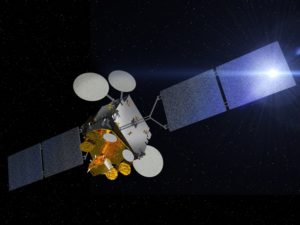
Following revelations in September 2018 by French defence minister Florence Parly that Russian reconnaissance satellites had maneuvered close to the Athena-Fidus Franco-Italian communications satellite in 2017 in a suspected act of espionage, the French Joint Space Command and the Ministry of Defence are preparing a space defence strategy that will be submitted to President Emmanuel Macron for his approval by the end of 2018.
While details regarding the content of the draft space defence strategy are scant, General Michel Friedling, commander of the Joint Space Command, revealed some broad outlines of the courses of action France will likely undertake in an interview with French science policy magazine Challenges published in Paris on 11 November 2018.
In the interview, General Friedling notes that the revelation that a Russian Louch-Olympus reconnaissance satellites had probably spied on the Athena Fidus satellite had come as a wake-up call to the French national security space community.
“The report may seem alarmist, but it is realistic,” said General Friedling. “Our satellites are insufficiently protected. We have to face a double break in the space sector. On the one hand, the arrival of private actors from New Space, with more and more small satellites in orbit. On the other hand, strategic competition is growing between the big powers (United States, China, Russia) in space.”
On the U.S. Space Force proposed by President Donald J. Trump, General Friedling expressed broad support stating that, “There is a general awareness of the importance of these topics, also favored by Donald Trump’s Space Force project. This project is not a fad: it results from a desire to give the space subject the importance it deserves in American politics.”
When asked what kinds of threats that French military satellite systems face, General Friedling cited cyber and electronic warfare threats, laser dazzling of sensors, physical sabotage of ground infrastructure, as well as other threats,.
“First, there are virus and malware attacks, both on the ground stations and on the satellites themselves,” said General Friedling. “There is the risk of sabotage of ground stations. It can also include the electronic jamming of satellites, their laser blindness, or even their deorbitation by a third satellite, or their remote control by enemy forces.”

General Friedling was also asked about the possibility of the use of kinetic-kill antisatellite (ASAT) weapons, and was quick to condemn their use as a weapon of last resort as well as the likelihood that their use in war could create a cascading space debris effect known as the Kessler Syndrome.
“Nobody has interest in destroying satellites in space. This is really the scenario of the worst: it creates a lot of debris, as shown by the Chinese shooting of 2007, which has generated thousands. The risk is Kessler’s syndrome, which is an uncontrollable chain reaction. Space exploration, and even the launch of satellites, would then become impossible. All these questions lead us to question the evolution of space law, which dates essentially from the 1967 space treaty,” said General Friedling.
The French military – which operates globally – has about a dozen satellites in orbit to include the Syracuse series of military communications satellites; the Athena-Fidus military communication satellite in cooperation with Italy; the Helios military reconnaissance series of satellites; Spirale missile early warning satellites; as well as a number of signals and electronic intelligence (SIGINT/ELINT) satellites.





